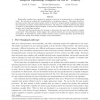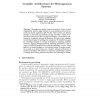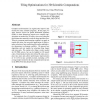0
posts
with
0
views
0
views
128
click to vote
CGO
2011
IEEE
14 years 5 months ago
2011
IEEE
Abstract—Current programming models and compiler technologies for multi-core processors do not exploit well the performance benefits obtainable by applying algorithm-specific, ...
152
click to vote
TJS
2002
15 years 1 months ago
2002
Historically, compilers have operated by applying a fixed set of optimizations in a predetermined order. We call such an ordered list of optimizations a compilation sequence. This...
116
click to vote
INFORMATICALT
2007
15 years 1 months ago
2007
Internationalization of compilers and localization of programming languages is not a usual phenomenon yet; however, due to a rapid progress of software and programming technologies...
154
click to vote
ICFP
2010
ACM
15 years 2 months ago
2010
ACM
We describe the design, implementation, and use of a machinecertified framework for correct compilation and execution of programs in garbage-collected languages. Our framework ext...
150
click to vote
ASPLOS
2008
ACM
15 years 4 months ago
2008
ACM
Today's system programmers go to great lengths to extend the languages in which they program. For instance, system-specific compilers find errors in Linux and other systems, ...
122
click to vote
LCPC
1995
Springer
15 years 5 months ago
1995
Springer
Heterogeneous parallel systems incorporate diverse models of parallelism within a single machine or across machines and are better suited for diverse applications 25, 43, 30]. Thes...
143
click to vote
SC
2000
ACM
15 years 5 months ago
2000
ACM
Compiler transformations can significantly improve data locality for many scientific programs. In this paper, we show iterative solvers for partial differential equations (PDEs) i...
150
click to vote
ICCL
1992
IEEE
15 years 6 months ago
1992
IEEE
We describe the automatic generation of a provably correct compiler for a non-trivial subset of Ada. The compiler is generated from an emantic description; it emits absolute code ...
133
click to vote
FPCA
1993
15 years 6 months ago
1993
Five implementations of di erent lazy functional languages are compared using a common benchmark of a dozen medium size programs. The benchmarking procedure has been designed such...





